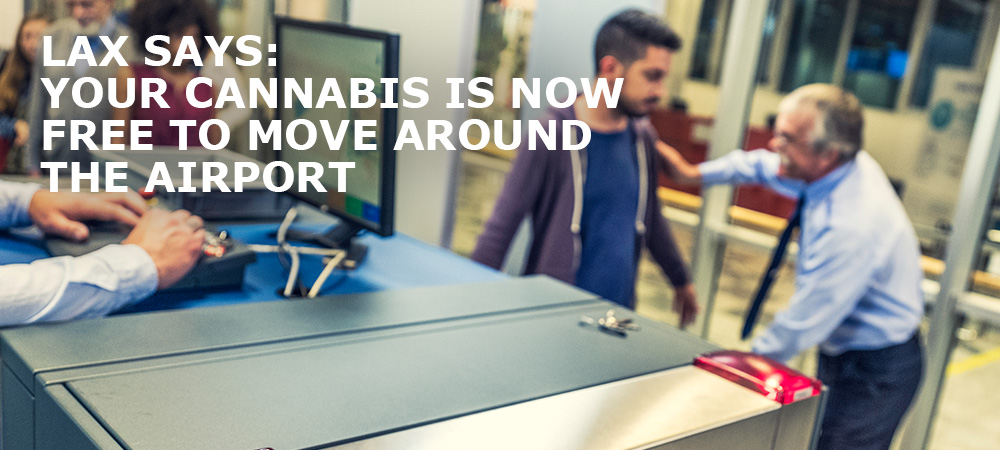Attention Passengers: Your Cannabis Is Now Free To Move Around LAX
Los Angeles International Airport (LAX) which is part of the Los Angeles World Airports Network updated its public marijuana policy on its website to allow transporting legal amounts of cannabis through security checkpoints and onto planes. Of course like smoking, using cannabis at the airport still is prohibited.
Possessing Cannabis At LAX
LAX policy states “While federal law prohibits the possession of marijuana (inclusive of federal airspace), California’s passage of proposition 64, effective January 1, 2018, allows for individuals 21 years of age or older to possess up to 28.5 grams of marijuana and 8 grams of concentrated marijuana for personal consumption. In accordance with Proposition 64, the Los Angeles Airport Police Department will allow passengers to travel through LAX with up to 28.5 grams of marijuana and 8 grams of concentrated marijuana. However, passengers should be aware that marijuana laws vary state by state and they are encouraged to check the laws of the states in which they plan to travel.”
LAX Policy Conflicts With Federal Law Enforcement
We previously reported in our blog that the U.S. Customs And Border Protection Agency (“CBP”) on September 21, 2018 issued a press release restricting admissibility of any traveler into the United States who is determined to be “a drug abuser or addict, or who is convicted of, admits having committed, or admits committing, acts which constitute the essential elements of a violation of (or an attempt or conspiracy to violate) any law or regulation of a state, the United States, or a foreign country relating to a controlled substance, is inadmissible to the United States”.
The CBP further stated that “as marijuana continues to be a controlled substance under United States law, working in or facilitating the proliferation of the legal marijuana industry in U.S. states where it is deemed legal or Canada may affect admissibility to the U.S.” Query, exactly how will the CBP evaluate and determine that any traveler into the United States is associated with the cannabis industry?
Also, LAX policy does not extend to other airports or points of entry so it is a good idea to check the laws and regulations of the jurisdictions you are travelling to.
Despite a growing number of states in the U.S. legalizing cannabis and now Canada legalizing cannabis, U.S. cannabis business must still face the ongoing challenges of running a cannabis business given the illegal status under U.S. Federal law. Those challenges being: your local Federal District Attorney shutting down your business and seizing assets; losing all bank privileges; and getting a big tax bill from IRS that you cannot pay.
Risk Of Getting A Big Tax Bill From IRS That You Cannot Pay
Generally, businesses can deduct ordinary and necessary business expenses under I.R.C. §162. This includes wages, rent, supplies, etc. However, in 1982 Congress added I.R.C. §280E. Under §280E, taxpayers cannot deduct any amount for a trade or business where the trade or business consists of trafficking in controlled substances…which is prohibited by Federal law. Marijuana, including medical marijuana, is a controlled substance. What this means is that dispensaries and other businesses trafficking in marijuana have to report all of their income and cannot deduct rent, wages, and other expenses, making their marginal tax rate substantially higher than most other businesses. A cannabis business that has not properly reported its income and expenses and not engaged in the planning to minimize income taxes can face a large liability proposed by IRS reflected on a Notice Of Deficiency or tax bill.
Of the three big risks, by far this is the one posing the greatest challenge as the Federal taxation of cannabis businesses is consistent in all states and not dependent on whether local Federal prosecutors are aggressive in enforcing the illegality of cannabis or the banks unwilling to do business with the cannabis industry. This unexpected liability can put you out of business so it is important to secure qualified tax counsel to be proactive with tax planning to minimize taxes and to defend you in any tax examinations, appeals or litigation with the IRS.
What Should You Do?
Considering this risks of cannabis you need to protect yourself and your investment. Level the playing field and gain the upper hand by engaging a Cannabis Tax Attorney at the Law Offices Of Jeffrey B. Kahn, P.C. located in Orange County (Irvine), the Inland Empire (Ontario and Palm Springs) and other California locations. We can come up with solutions and strategies to these risks and protect you and your business and to maximize your net profits.


